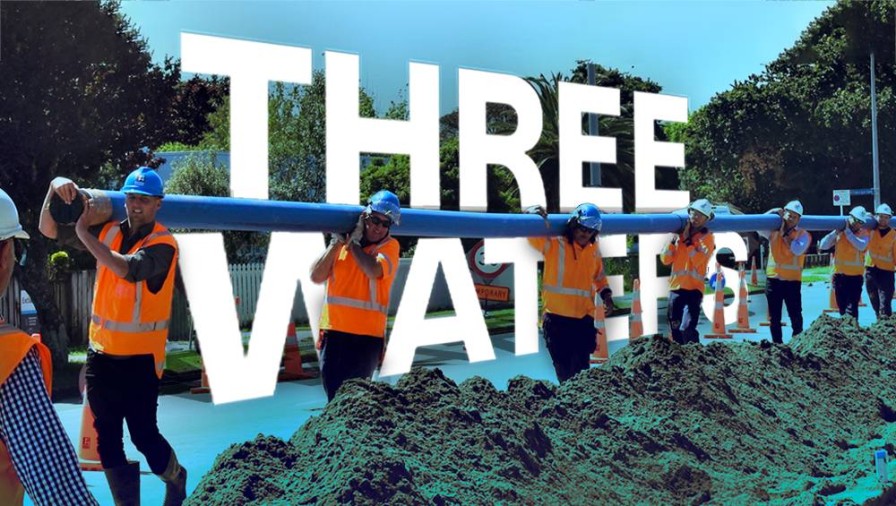Coalition agenda, protests, leaks, and a mini budget to come
ANALYSIS: The Government is getting on and scrapping its predecessor’s legislation.
WATCH: NBR political editor Brent Edwards speaks with Grant Walker.
ANALYSIS: The Government is getting on and scrapping its predecessor’s legislation.
WATCH: NBR political editor Brent Edwards speaks with Grant Walker.
The Government seems slightly dismayed, aggrieved even, that some of its policy initiatives – mainly scrapping policies of the former Government – have attracted such opposition and prompted large protests.
Its decision to scrap amendments to the Smokefree legislation – which would have toughened the anti-smoking regime but had not yet come into effect – has drawn widespread criticism, particularly from the health sector, and has earned the country negative headlines overseas. At the recently finished COP28 meeting, New Zealand won the ‘Fossil of the Day’ award over the Government’s decision to repeal the ban on offshore oil and gas exploration and Te Pāti Māori organised a range of protests against changes the Government is making to the use of te reo Māori in government agencies, its scrapping of the Māori Health Authority, and of its intention to introduce legislation on the principles of the Treaty of Waitangi.
At the same time, the Government suffered two early leaks, one on its plans to repeal the fair pay agreements legislation and the other on the fact that the Government had quietly suspended the need for regulatory impact analyses on some of its proposals repealing existing laws.
The first week or so of the new Government prompted Labour leader Chris Hipkins to describe it as the most shambolic beginning of any government in New Zealand history.
NBR presenter Grant Walker says it is hard to argue with that and asks whether a government has ever started like this before.
Put into context, there have been some blips for this Government, but that’s hardly any different to previous governments. Talking about shambolic, it is hard to go past the difficult period the former Government had earlier this year when it lost four ministers in a matter of a few months.
Aside from two leaks – which presumably came from within the public service rather than ministers’ offices – much of the ‘shambolic’ nature of the Government’s start related to it implementing policies the three coalition partners campaigned on, but which are controversial and do attract strong and sustained opposition. Politically, the big question will be whether the mandate the Government says it has to carry out these policies – particularly relating to the Treaty of Waitangi and the relationship with Māori – do have majority support. And whether it also will be rewarded for scrapping fair pay agreements, as it did this week in Parliament.
We will not know the answers to those questions until the next election.

Labour leader Chris Hipkins calls the Government’s start the most shambolic ever.
Certainly, the Government is getting on and doing things – even if, largely, that is about simply scrapping legislation or other initiatives put in place by its predecessor. That also includes changing the Reserve Bank’s mandate back to a single focus on price stability and, in its most recent decision, telling KiwiRail there is no more public money for its project to replace the Cook Strait ferries. The original $775 million project has blown out to about $3 billion and, with the Government withdrawing its support, KiwiRail must now go back to the drawing board.
This is likely to mean more years of sub-standard service on the Cook Strait as KiwiRail will presumably have to keep its existing ageing and breakdown-prone ferries afloat for much longer than it might have anticipated.
Finance Minister Nicola Willis is clear this is an example of the Government showing it is responsible about spending public money. Had the Government agreed to front up with another $1.47b she could not have guaranteed costs – mainly on constructing new terminals needed for the larger ferries – would not have continued to rise.
While the decision has attracted criticism from Labour MPs, there is no guarantee a Labour-led government – had it still been in power – would have agreed to such a large spend-up. While Labour had increased the contingency spending for the project, the Treasury had been warning it for months about the risks in the project and it seemed pretty clear then that Labour ministers too were reluctant to bail it out.
Willis wants KiwiRail to opt for a ‘Toyota Corolla’ version, not a ‘Ferrari’ one. That might include buying second-hand ferries, rather than having new ones built from scratch. The issue raises all the challenges facing infrastructure in this country: how much to spend and how much should infrastructure be future-proofed, so it lasts well into the century?
When it comes to infrastructure, Auditor-General John Ryan tabled a report in Parliament this week criticising the previous Government’s management of its $12b New Zealand Upgrade Programme and the $3b Shovel Ready Programme. NZUP was devised before the Covid-19 pandemic as the country was already looking at an economic slowdown. It got more impetus after Covid, and the Shovel Ready Programme was set up in order to respond to the economic impacts of the pandemic.

Finance Minister Nicola Willis.
But Ryan found decision making was rushed, as ministers put more focus on speed than on getting it right. Record keeping and monitoring of projects were also not as good as they could have been. The report will be grist to the mill for the new Government, which in Opposition accused Labour repeatedly of irresponsible spending.
Putting the politics aside, the Auditor-General’s report is a valuable guide to ensuring money is well spent, investment decisions are carefully considered, and monitoring is appropriate.
It will be interesting to see whether the Auditor-General also takes a look at the Cook Strait ferry project.
Meanwhile, Māori remain unhappy with the Government, with the Tauranga-based Ngai Te Rangi Settlements Trust making an urgent claim to the Waitangi Tribunal accusing the Government of attacking Māori culture and language. It says the Government is breaching Article two of the Treaty by failing to protect te reo Māori.
Treaty Negotiations Minister Paul Goldsmith already faces criticism for remarks he made earlier in his career about the positive aspects of colonialisation. He will have his hands full trying to persuade iwi the Government remains committed to resolving outstanding Treaty grievances.

Treaty of Waitangi Negotiations Minister Paul Goldsmith faces a challenging time.
The Government has also confirmed it will repeal the Three Waters reform process, with legislation due to be introduced to Parliament early next year.
“It’s clear the previous Government’s approach of removing community control of water assets and prescribing co-governance was hugely unpopular and proposed a one-size-fits-all approach,” Local Government Minister Simeon Brown said.
Once repealed, the Government then expects to make progress on its Local Water Done Well policy, which includes encouraging councils to set up their own regional water agencies.
Infrastructure New Zealand policy director Michelle McCormick said the status quo was not an option and that she was encouraged by the Government seeking to address the challenges councils faced in developing their long-term plans. The organisation urged the Government to pursue council balance sheet separation – a key element of the reform the Government is repealing – as part of new, sustainable funding model for water assets.
But questions remain about how much cost ratepayers will face as councils do catch-up work on ageing and ailing water infrastructure. Whoever pays, it is not going to be cheap, with Wellington alone estimating it needs to spend $30b on its water infrastructure over the next 30 years.

The Three Waters reform programme will be scrapped early next year.
Next week, the Government’s early burst of parliamentary activity will come to an end as Parliament breaks for Christmas and the New Year, but MPs will be back at it when Parliament resumes sitting in late January.
Most interest next week will be on Finance Minister Nicola Willis’ mini budget. Will it outline tax cuts for next year and what will be the cost?
One thing is sure: with the unveiling of the Half-year Fiscal and Economic Update, Willis will deliver plenty of bad news about the state of the Government’s books and she will blame it all on Labour.
It will also come after GDP figures out this week show the economy shrank slightly in the three months to the end of September and grew just a piddling 1.3% for the year.
The only good news about that is it surely confirms the Reserve Bank will not need to pump up interest rates any further.

The Reserve Bank will surely be cheered by the latest economic figures.
Sign up to get the latest stories and insights delivered to your inbox – free, every day.